The guinea pigs are probably the most adorable house pets on the planet. They are cute, sociable, and want to hang out with other guinea pigs or owners. Even better, they are budget-friendly in every single aspect, especially when it comes to food.
They eat fresh produce or almost all the veggies, fruits, herbs, roots, or even flowers. Now, let’s see if can you feed guinea pigs basil.
Can guinea pigs eat basil? Guinea pigs can eat basil but only in moderation. Basil is safe for guinea pigs, but it requires some precautions. This is because basil contains calcium and phosphorus, which can create urinary problems in guinea pigs. However, there are many vitamins and minerals in basil that are beneficial for our guinea pigs.
They eat many different herbs and plants. However, some herbs might be toxic to them. With basil, that’s not the case. Basil is a herb from the mint family with a strong, peppery taste and sweet smell.
There are many different basil varieties. People tend to use them in cuisines, but also in folk medicine all over the world.
In this article, read more about the nutritional contents and health benefits of basil as food for guinea pigs. Also, find out if any possible risks can come from guinea pigs eating basil and some tips on including basil in their diet. Let’s start!
Table of Content
Is Basil Good for Guinea Pigs? | Health Benefits
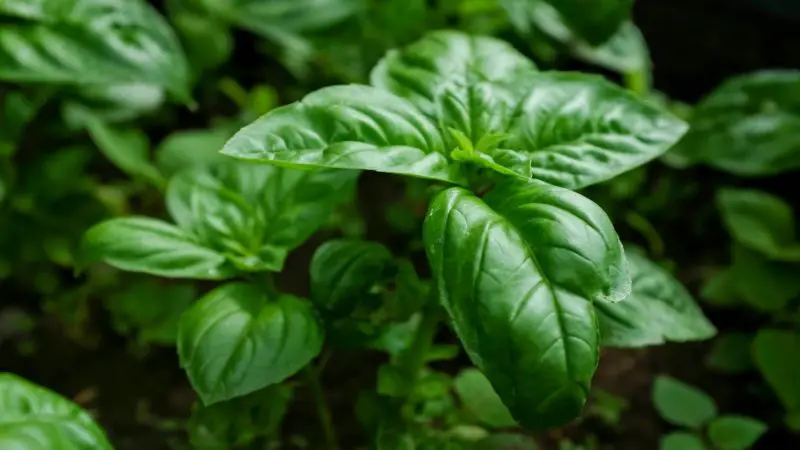
Scurvy Prevention
The most important benefit of basil is that it has vitamin C. This vitamin is incredibly beneficial for guinea pigs and their overall health. We can even say vitamin C is a life-saver for guinea pigs!
Unfortunately, they don’t make this vitamin naturally in their bodies, and when they ingest it, they can’t store it. Regular ingestion of this vitamin through supplements or food is crucial for their health.
If there is a deficit of vitamin C, the guinea pigs will most likely get scurvy disease. If this happens, they will have the following symptoms: fatigue, a rough coat, no appetite, stiff joints and limbs, and nose and eye discharge.
Good Digestion, Energy and Immunity
Another benefit of basil is that it has natural fibers and proteins that improve digestion and provide energy for a whole day. Basil as a source of slow-release energy is important for our guinea pigs’ normal function and for reducing stress, sleep problems, exhaustion, anxiety, and depression.
Another benefit worth mentioning is zinc. This mineral protects the immune system, speeds up the healing of wounds, and keeps DNA healthy. This is also important for pregnant guinea pigs and their offspring.
Antioxidants
Basil also has many vitamins and minerals that contribute to the health of a guinea pig. Vitamin A is an excellent and powerful antioxidant. It’s crucial because it fights inflammation and stops free radical damage.
The free radicals cause premature aging and many illnesses. Other benefits of this vitamin are optimal health of kidneys, heart, brain, skin, lungs, and even eyesight.
There is another beneficial ingredient, the antioxidant manganese. This antioxidant reduces all risks of all diseases overall. This powerful antioxidant keeps connective tissues strong, balances hormones, controls the metabolism of sugars and calcium.
Healthy Cardiovascular System
There is not a lot of fat in basil, which is also good for the cardiovascular system. A low amount of sugar is healthy overall for the blood sugar levels and the whole organism.
Minerals such as iron and magnesium are beneficial for healthy blood, blood cells, strong and healthy bones, and a healthy heart. Potassium in basil reduces blood pressure and relaxes blood vessels.
Nutrition Facts of Basil for Guinea Pigs
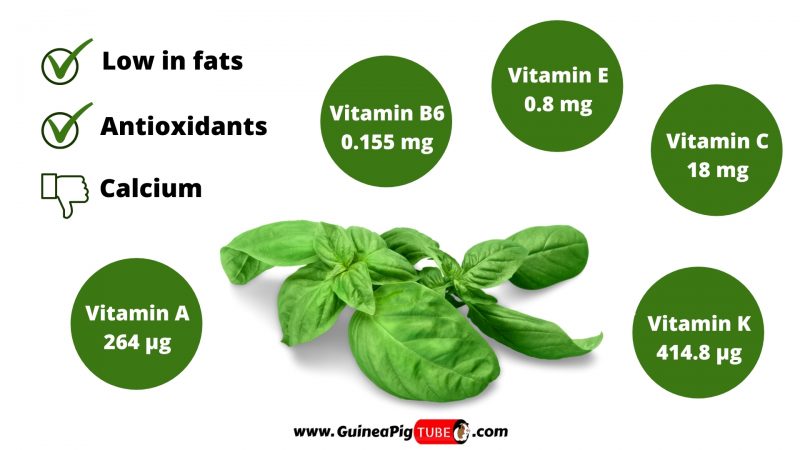
The basil is a very aromatic and tasty herb for both humans and guinea pigs. Now, let’s see the nutritional values of this herb. Serving size of 3 oz (100 g) of basil contains the following nutrients:
- Energy – 23 kcal
- Protein – 3.15 g
- Total lipid (fat) – 0.64 g
- Carbs – 2.65 g
- Dietary fiber – 1.6 g
- Sugars – 0.3 g
- Calcium – 177 mg
- Iron – 3.17 mg
- Magnesium – 64 mg
- Phosphorus – 56 mg
- Potassium – 295 mg
- Sodium – 4 mg
- Zinc – 0.81 mg
- Copper – 0.385 mg
- Selenium – 0.3 µg
- Vitamin C – 18 mg
- Vitamin B-6 – 0.155 mg
- Vitamin A – 264 µg
- Vitamin E – 0.8 mg
- Vitamin K – 414.8 µg
- Thiamin – 0.034 mg
- Riboflavin – 0.076 mg
- Niacin – 0.902 mg
- Folates – 68 µg
- Carotene, beta – 3142 µg
- Lutein + zeaxanthin – 5650 µg
Is Basil Bad for Guinea Pigs? | Possible Risks
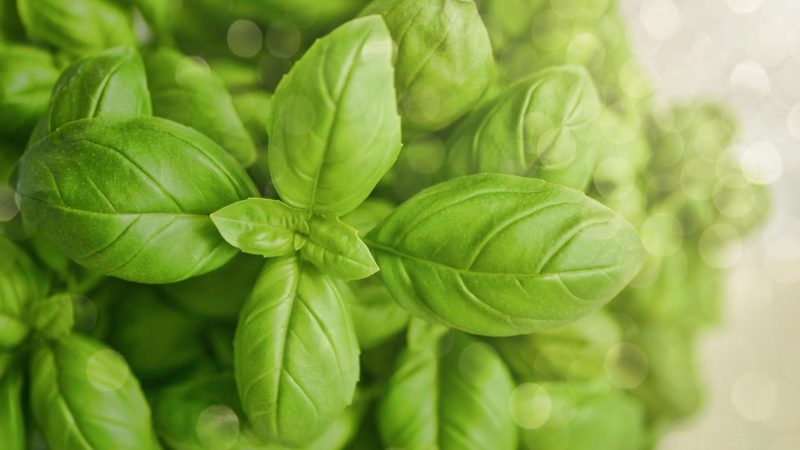
There are some risks of consuming too much basil for guinea pigs or even consuming it too often. Some of them are the following:
Urinary Problems
There are phosphorus and calcium in the basil plant. They can cause urinary problems in guinea pigs. When there is an excess of these items in the guinea pigs’ body, the urinary tract will show certain changes. The bladder and kidneys can develop stones with excess calcium.
This problem is commonly seen in rodents. So, too much excess calcium can make urinating for the guinea pigs very painful and problematic. Please don’t take this lightly, as it can develop into a serious problem and even lead to renal failure with fatal consequences. The phosphorus binds with the calcium and causes all kinds of problems.
Digestive Problems
Another risk of too much basil is digestive problems. This goes for any food, no matter how healthy it is. Anything in excess can cause problems. So, large servings of basil and more than 2 times weekly can result in a disturbed digestive system of your cute guinea pig pet.
The guinea pigs might be bloated or flatulent. If it’s more serious, there will be diarrhea and even vomiting in extreme cases. So, please stick to the rules and feed them basil only in moderation.
Allergies
Guinea pigs can develop different food allergies, and there is a possibility of basil allergy as well. Though basil allergies are rare, you need to be careful when feeding basil to guinea pigs for the first time.
Give them a small amount of basil and look for any symptoms. Some of the symptoms of basil allergies are swelling, difficulties in breathing, or vomiting. If you notice some of these symptoms, take your guinea pig to the vet immediately.
Serving Size and Frequency of Basil for Guinea Pigs
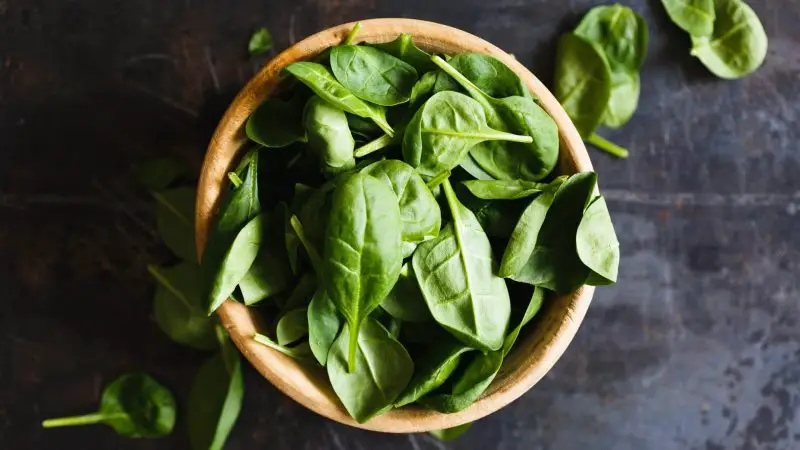
Can Guinea Pigs Have Basil Every Day?
Guinea pigs can’t have basil every day. It is simply not recommended because they need a versatile diet. Also, due to the possible risks, we have already said that basil needs to be given to guinea pigs only in moderation.
Guinea pigs can eat basil two times per week. That’s more than enough for them to get all the healthy nutrients from basil.
How Much Basil Can Guinea Pigs Eat?
You shouldn’t give a huge amount of basil to guinea pigs at once, especially if you are feeding them basil for the first time. A small amount is fine, for example, less than a handful for one guinea pig and two times per week maximum.
Guinea pigs are small animals with sensitive digestive systems, and huge amounts of food may upset their stomach. Also, they love to eat, and they will eat everything you give to them because sometimes they don’t know when to stop eating. So it would be best if you were careful with the serving sizes of guinea pig’s food to avoid overfeeding them.
Do Guinea Pigs Like Basil?
Guinea pigs adore eating herbs and plants. Most of them have some favorite herbs they like to eat regularly, and basil is one of them. However, some guinea pigs are crazy for this herb and aroma, but some guinea pigs dislike the fresh and raw basil because the aroma is just too powerful for their taste.
Also, there are other herbs that you can introduce to your guinea pigs, such as mint, dill, parsley, cilantro, oregano, endive, fennel, dandelion, etc. These herbs and plants are like a real treat for the guinea pigs.
More Information About Guinea Pigs and Basil
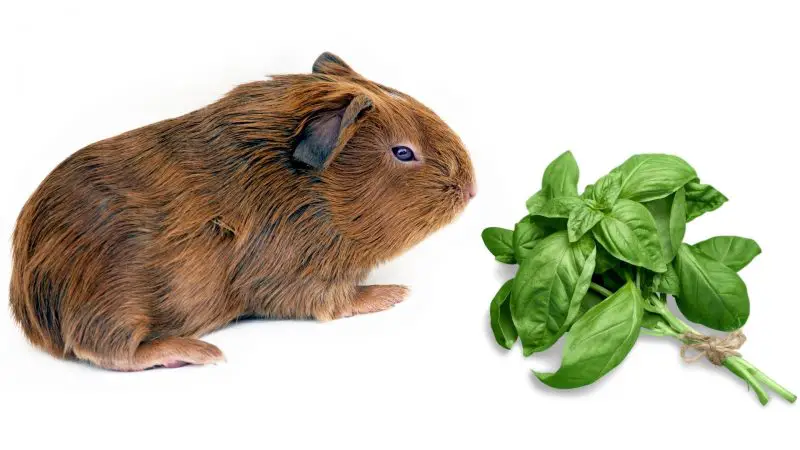
There are a few types of basil, such as the Mediterranean basil with green leaves, Greek basil with peppery-like leaves, purple basil with darker leaves, lemon basil with lemony-citrus flavor, and Thai basil with a strong and spicy aroma. They are mostly famous for their use in different cuisines.
In the following sections, we will talk more about what parts of basil you can feed to your guinea pigs, and what basil types are good for them. Let’s see!
Can Guinea Pigs Eat Fresh Basil?
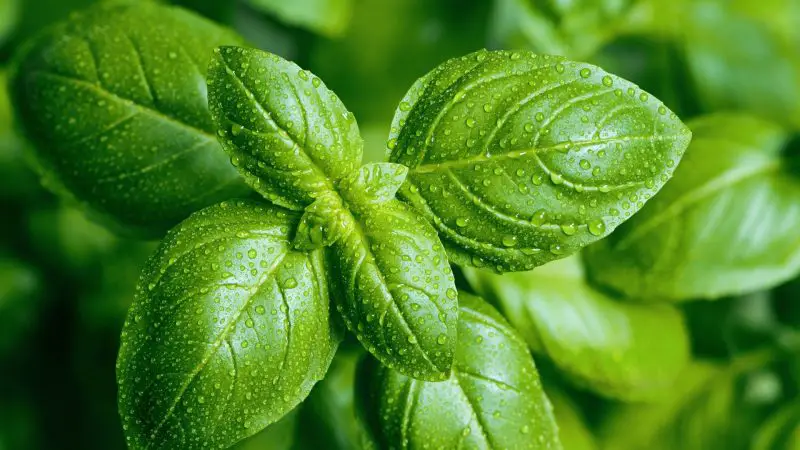
Guinea pigs can eat fresh basil, and that’s the best and only way to introduce basil into their diet. Never feed them stale basil, or cooked basil, because that way basil loses its nutrients and can upset guinea pig’s stomach.
Guinea pigs are herbivore animals, and they enjoy eating only fresh and raw foods. Just be sure to wash basil thoroughly with water before feeding it to guinea pigs.
If you want to keep basil fresh for a longer time, you can store it in the refrigerator. But, before giving it to guinea pigs, be sure to keep basil at room temperature for some time. Also, if the basil has a stem, you can keep it in a glass of water. Just be sure to change the water every day. With this, you can keep basil fresh for up to one week.
Can Guinea Pigs Eat Basil Leaves?
Basil has ovate or heart-shaped green leaves, from 3 cm to 11 cm long and between 1 cm to 6 cm (0.4″ to 2.36″) wide. Their size and shape also depend on the basil cultivar.
Guinea pigs can eat basil leaves, but also only in moderation. Basil leaves contain some compounds that can be harmful to guinea pig’s digestive system if consumed in large quantities. Due to that, you need to be careful with serving size and frequency and provide them only fresh basil leaves.
Can Guinea Pigs Eat Basil Flowers?
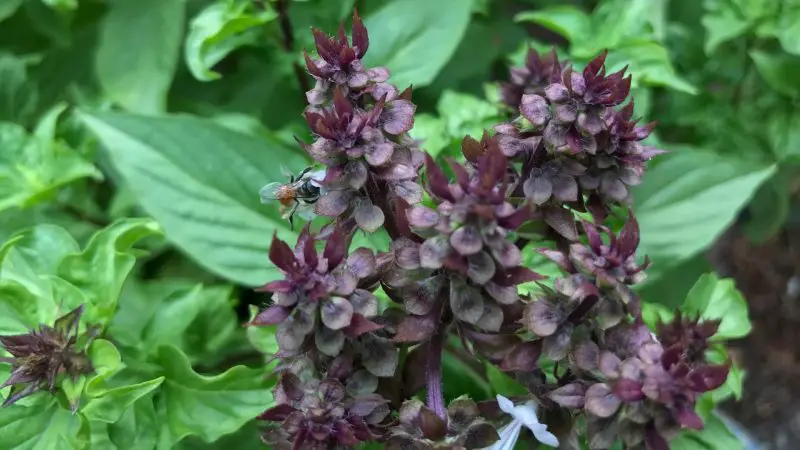
There are different colors of basil flowers depending on the basil variety. So you can find basil with purple or white flowers. Guinea pigs can eat basil flowers in moderate serving sizes and not very often. Basil flowers taste similar to basil leaves, but they have a milder flavor.
There are many other flowers that guinea pigs enjoy eating, but also some that are toxic to them. When it comes to basil flowers, be sure to give them only fresh and well-washed flowers of basil in moderation.
Can Guinea Pigs Eat Basil Stalks/Basil Stems?
Guinea pigs can eat basil stalks or basil stems, but be careful with serving sizes and frequency. Basil stalks tend to be a bit more fibrous than basil leaves. So, if guinea pigs overeat on them, they may suffer from stomach pain.
On the other side, the guinea pig will enjoy eating basil stems due to their crunchier texture and flavor. It’s recommended to provide them with fresh, younger, and thinner basil stems because they are less bitter in taste than older ones.
Can Guinea Pigs Eat Greek Basil?
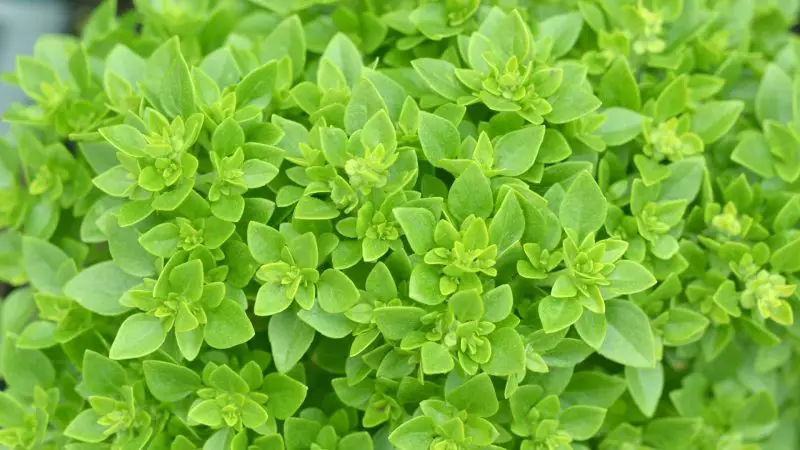
Greek basil is one of the most known types of this herb, and it grows wild around Greece. This is one of the smallest types of basil and has small pointed leaves.
Guinea pigs can eat Greek basil in moderation. It is known that this herb has medical value for people, as well as for guinea pigs.
However, it’s important to give them only small amounts of Greek basil a few times per week due to possible risks.
The good thing is that you can grow Greek basil in the pot because it doesn’t need a lot of space due to its compact, rounded growth habit. This way, your guinea pigs will always have fresh Greek basil without any pesticides.
Can Guinea Pigs Eat Green Ruffles Basil?
Green ruffles basil is an annual herb with green curled leaves. This basil can grow up to 24 inches tall and also has quite larger leaves. Guinea pigs can eat green ruffles basil, but also only in moderate serving sizes and frequency. Green ruffles basil has a milder flavor, and guinea pigs will enjoy it.
Can Guinea Pigs Eat Lemon Basil?
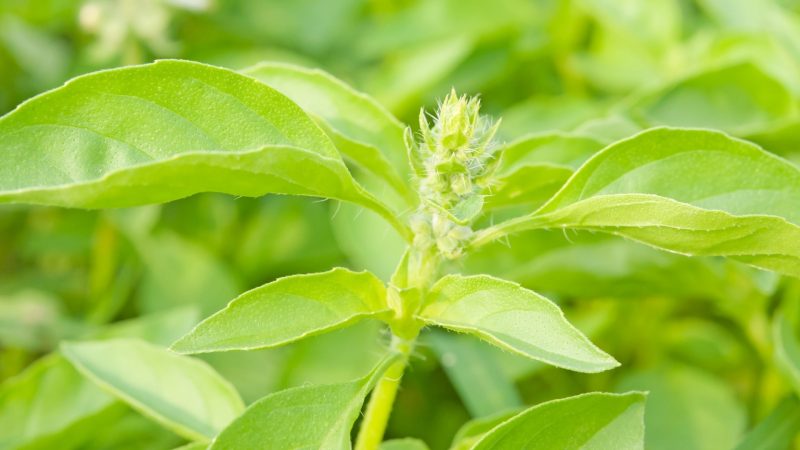
Guinea pigs can eat lemon basil, but you need to make sure not to feed them this basil too often. Lemon basil is a herb with small to medium green leaves and an elliptical to elongated oval shape.
This type of basil can grow up to 8 to 20 inches tall, and in late summer, it has small white flowers. The flavor of lemon basil is sweet with notes of lemon.
Lemon basil is good for guinea pigs because it is an excellent source of vitamin K, vitamin C, beta carotene, and minerals such as magnesium, iron, copper, manganese, and others. However, due to calcium content, it should be given to guinea pigs only in moderation.
Can Guinea Pigs Eat Sweet Basil?
Sweet basil is the most popular type of basil with dark green leaves and a sweet but slightly spicy flavor. This basil can grow 12-18 inches tall and there are more than 60 different varieties of sweet basil. Guinea pigs can eat sweet basil, but like any other type of basil, it should be given to them only in moderation.
Can Guinea Pigs Eat Thai Basil?
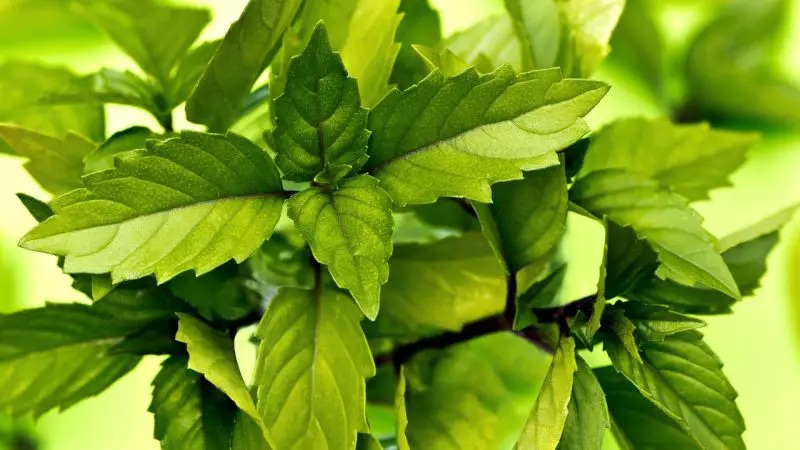
Thai basil is a perennial herb native to southeast Asia and has small narrow leaves and purple stems and flowers. This type of basil is aromatic and has a strong spicy flavor.
Guinea pigs can eat Thai basil but remember to offer them the right amount of this basil. Thai basil has high levels of vitamin C, vitamins K and vitamin A, as well as beta-carotene, magnesium, iron, and potassium.
Even if Thai basil is beneficial for guinea pig’s health, it should be given in moderation. That’s because calcium content, which in excess, can cause urinary problems in guinea pigs.
Quick Facts on Basil
The following are some facts about basil:
- Basil is a herb that belongs to the mint family.
- The origin of the basil name is from the Greek word “basileus.”
- When translated from Greek, the term “basileus” means “king.”
- Basil is mostly used in cooking, but also it has other uses in society.
- This herb is also used in folk medicine in the form of tea.
- Basil helps in treatments of stomach cramps, constipation, flatulence, anxiety, and depression.
- This herb repels insects and is toxic to mosquitoes.
- Basil is also used as an ancient medicine as an antidote for snake bites.
- It has some religious meaning, and it is believed that basil gives strength during religious fasting.
- In Greece, basil was considered to be a magnificent, royal and kingly herb and the symbol of mourning.
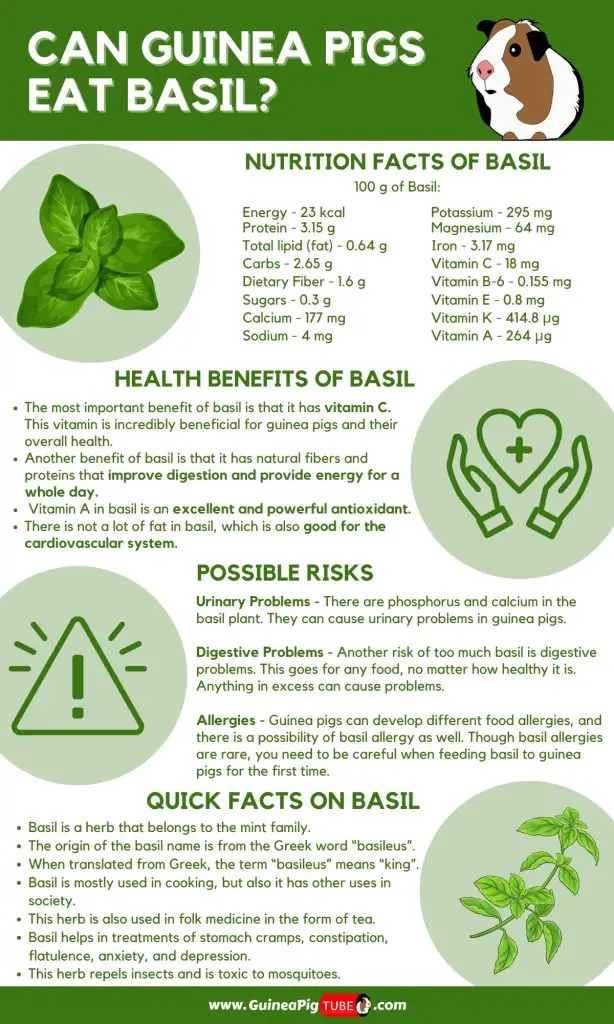
We have also made a full list of foods that guinea pigs can and can’t eat (150+ Types of Foods). Be sure to also check our recommended products page for everything you will ever need to assure a happy life for your guinea pigs. Hope this information was helpful and you have found the answer you were looking for.
List of Sources
Nutrient Requirements of Laboratory Animals: Fourth Revised Edition
The Effects of Diet on Anatomy, Physiology and Health in the Guinea Pig
